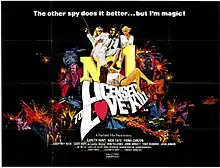| Licensed to Love and Kill | |
|---|---|
 Original film poster | |
| Directed by | Lindsay Shonteff |
| Written by | Lindsay Shonteff (as Jeremy Lee Francis) |
| Produced by | Elizabeth Gray |
| Starring | Gareth Hunt |
| Cinematography | Bill Patterson |
| Edited by | Gerry Ivanov |
| Music by | Leonard Young |
Production company | Lindsay Shonteff Film Productions |
| Distributed by | Firebird Films |
Release date | August 1979 (UK) |
Running time | 94 minutes 78 minutes (US) |
| Country | United Kingdom |
| Language | English |
Licensed to Love and Kill is a 1979 imitation James Bond film starring Gareth Hunt as British secret agent Charles Bind. It was directed and written by Lindsay Shonteff and produced by his wife Elizabeth Gray. The film had the working title An Orchid for No. 1; it was released on VHS under the title The Man from S.E.X. and Undercover Lover.
Plot
Secret Agent Charles Bind is called in to investigate the disappearance of Lord Dangerfield, a British diplomat. The trail leads Bind to Dangefield's daughter Carlotta Muff-Dangerfield who is called "Lotta Muff", an ambitious American Senator named Lucifer Orchid, and Bind's counterpart in the forces of evil, Ultra One.
Cast
- Gareth Hunt ... Charles Bind
- Nick Tate ... Jensen Fury
- Fiona Curzon ... Carlotta Muff-Dangerfield
- Geoffrey Keen ... Stockwell
- Gary Hope ... Senator Lucifer Orchid
- Don Fellows ... Vice-president
- John Arnatt ... Merlin
- Toby Robins ... Scarlet Star
- Imogen Hassall ... Miss Martin
- John Junkin ... Helicopter mechanic
- Me Me Lai ... Female Madam Wang
- Noel Johnson ... Lord Dangerfield
- Anna Bergman ... Hotel receptionist
- Eiji Kusuhara[1] ... Male Madam Wang
- Doug Robinson ... Giant
- Deep Roy ... Midget
Aspects of production
During the production of Henson and Shonteff's previous Charles Bind film No. 1 of the Secret Service, a sequel was announced entitled An Orchid for No. 1.[2] Though initially signed to Shonteff for three films, Nicky Henson was signed by the Royal Shakespeare Company. Henson was replaced by Gareth Hunt who was well known for his role as secret agent Mike Gambit in The New Avengers.
Geoffrey Keen repeated his role as Bind's M type superior Rockwell. The original Rockwell from the Tom Adams Charles Vine films was played by John Arnatt who returned to Shonteff's series playing Merlin, the Q type character who issues Bind his secret weapons. Fiona Curzon who plays the female lead had a smaller different role in the previous No 1. of the Secret Service. Gary Hope had a role as an Army officer in the first Vine film Licensed to Kill.
Soundtrack
Simon Bell wrote the music and Doreen Chanter composed and performed the theme song, Love is a Fine Thing.
Reception
Alan Burton in Historical Dictionary of British Spy Fiction, which cites that "the cycle of spy films began to lose steam in the 1970s", and mentions Licensed to Love and Kill and its preceding film No. 1 of the Secret Service as "the odd picture [that] turned up in the cinema schedules", refers to both films as "crude parodies".[3]
References
- ↑ "Eiji Kusuhara obituary". TheGuardian.com. 27 May 2010.
- ↑ p. 288 Derry, Charles The Suspense Thriller: Films in the Shadow of Alfred Hitchcock McFarland, 2001
- ↑ Burton, Alan (2016). Historical Dictionary of British Spy Fiction. Rowman & Littlefield. p. 20. ISBN 9781442255876.